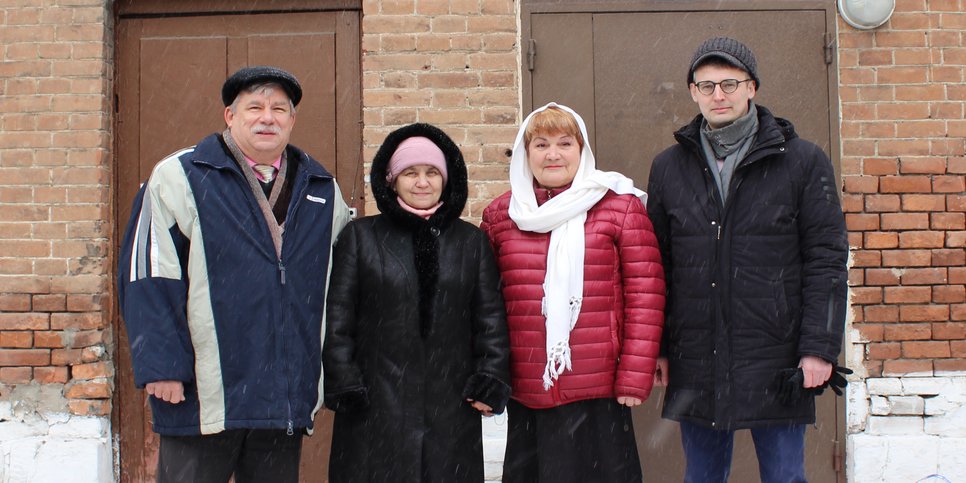Aleksey Trofimov, Olga Panyuta, Olga Opaleva, Dmitriy Malevaniy on the day of the verdict. February 2023
Aleksey Trofimov, Olga Panyuta, Olga Opaleva, Dmitriy Malevaniy on the day of the verdict. February 2023
The Court Sent Three of Jehovah's Witnesses From Spassk-Dalny to a Penal Colony for Discussing the Bible
Primorye Territory*Text updated on February 23, 2023.
On February 10, 2023, Pavel Bobrovich, judge of the Spassky District Court of the Primorye Territory, found four Jehovah's Witnesses guilty of extremism. 32-year-old Dmitry Malevaniy received 7 years in prison, 63-year-old Alexei Trofimov and Olga Panyuta — 6.5 and 4.5 years in prison , respectively. 70-year-old Olga Opaleva was given a 5-year suspended sentence.
After the announcement of the verdict, computer science teacher Malevaniy as well as pensioners Trofimov and Panyuta were taken into custody in the courtroom. They were sent to Pre-trial Detention Center No. 4 of the Main Directorate of the Federal Penitentiary Service for the Primorsky Territory (“Staryi Kliuch”). The convicted persons can appeal the verdict because they consider it baseless.
The criminal prosecution of believers from Spassk-Dalny has been going on since November 2018. As in many other cases, it began with searches, after which all four persons were sent to a temporary detention center and then placed under house arrest for almost a year. The Investigative Committee initiated a criminal case based on the charges of organizing the activity of an extremist organization and recruiting others in it (parts 1 and 1.1 of article 282.2 of the Criminal Code of the Russian Federation). The security forces considered conversations on Biblical topics and peaceful religious meetings, typical of all Jehovah's Witnesses in the world, as a crime. The accusations were based on the testimony of intelligence agents who pretended to have an interest in the Bible. One of them was a neighbor of Olga Opaleva.
The trial has been going on for over three years. During the hearings, the defense repeatedly drew attention to the inconsistency of the evidence against the believers. For example, the prosecution played recordings of conversations that took place before the period of the crime the defendants are accused of. On some of the recordings it was impossible to identify the voices; on others, the speakers were discussing cooking recipes and were joking. Also, several witnesses stated that their written statements were falsified. Even the secret witnesses could not confirm the guilt of the believers. For example, “Sidorova” admitted during interrogations that she had not heard calls for violent actions against anyone and that at the worship services of Jehovah’s Witnesses there was a friendly atmosphere and believers discussed exclusively religious issues.
Court hearings were postponed many times due to the poor health of Olga Opaleva, who had a particularly hard time dealing with the criminal prosecution. Just before the search, she suffered a heart attack. A year later, on her way to the court, Olga had a stroke. Around the same time, Olga's son, Vitaly, also faced criminal prosecution. Nevertheless, recalling that period of her life, the believer says: “I was surprised at myself, because I remained calm. I prayed to Jehovah, and there was peace in my heart. My sisters and brothers visited me, brought the most necessary things, wrote letters, sent postcards from other cities, called and sent text messages. I never felt lonely or abandoned. I had everything, even more than I needed for each day."
Aleksey Trofimov retired during the criminal proceedings and received the honorary title of labor veteran. Aleksey mentioned things that gave him strength during the trial, such as the help of others and the fact that he himself tried to support loved ones. He says: "You have to hold on, because others are holding on to you."
Also, Dmitry Malevaniy said: “We had everything we needed, and sometimes even a little more, so much so that we ourselves could take care of the needs of others.” Olga Panyuta expressed a similar thought: “We maintain a positive attitude thanks to the support we received from each other.”
In total, 46 of Jehovah's Witnesses in the Primorsky Territory have already faced persecution for their faith and have become defendants in 19 criminal cases. 20 believers have already been sentenced—19 received suspended sentences; one was acquitted, but a higher court overturned that decision and sent the case for new trial. At the time of this news release, six believers from the Primorsky Territory are being held in pre-trial detention.
On June 7, 2022, the European Court of Human Rights rendered a historic ruling in favor of Jehovah's Witnesses in Russia. It ruled that the Russian Federation had violated the rights of the followers of this denomination and ordered Russia to stop its persecution, release the prisoners, and pay them compensation. The Court noted in particular: “Both the applicants' [Jehovah's Witnesses'] religious activities and the content of their publications appear to have been peaceful in line with their professed doctrine of non-violence.” (§ 157)




